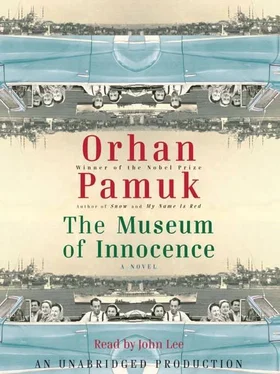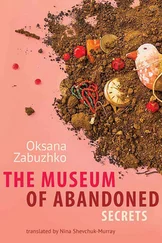I was spending more time in Beyoğlu, as there were fewer potential reminders of her there, but one day I had the shock of seeing her image reflected in a shop window. Another time a girl was skipping through a crowd in Beyoğlu, in a way I believe unique to Füsun. I gave chase but couldn’t catch up. Uncertain whether this person had been another mirage or my quarry, I went back at the same time for several days in a row to pace back and forth between Ağa Mosque and the Palace Cinema; failing to catch a glimpse of her, I’d take refuge in a beer hall and sit at the window, watching the passing crowds.
Those halcyon moments were so brief. This photograph of Füsun’s white shadow in Taksim captures an illusion that lasted only two minutes.
Over time I came to notice how many of our young girls and women shared Füsun’s figure, and how many dark Turkish girls bleached their hair blond. The streets of Istanbul were full of Füsun’s doubles, who would appear for a second or two and then vanish. But whenever I got a good look at one of these ghostly figures, I would see that she did not resemble my Füsun in the slightest. Once, while playing tennis with Zaim at the Tennis, Fencing, and Mountaineering Club, I spotted her among three giggling young girls, drinking Meltem at one of the tables; my greater surprise was not at seeing her, but at her having been admitted to this club. Another time her specter had just stepped off the Kadıköy ferry onto the Galata Bridge and was trying to hail a shared taxi. It was a while before my heart grew accustomed to these mirages, and then my mind. Once, during the intermission between two films at the Palace Cinema, four rows ahead of me in the balcony I saw her sitting with her sisters, enjoying a chocolate Mirage Ice, and I chose to forget that she had no sisters, for I had learned that until I could harvest the pleasure of an illusion there was no sense in dispelling it, at the expense of my aching heart.
There she was, standing before the Dolmabahçe Clock Tower, or walking through the Beşiktaş Market carrying a macramé bag like a housewife, or most surprising and unsettling, gazing down at the street from the window of a third-floor apartment in Gümüşsuyu. When she saw me in the street looking up at her, Füsun’s ghost stared back at me. When I waved, she waved back. But her manner of waving sufficed to tell me that she wasn’t Füsun, so I walked off in shame. Nevertheless, the apparition at the window prompted me to imagine that her father had quickly married her off in shame, perhaps to help her forget me. In my dream she was beginning her new life in that apartment but still wanted to see me.
Discounting the second or two of consolation that the first sightings of these ghosts brought me, I never for long forgot that they were not Füsun but figments of my unhappy imagination. Still, I could not live without the occasional sweet feeling, and so I began to frequent those crowded places where I might see her ghost; and eventually I would mark these places, too, on my mental map of Istanbul. Those places where her ghosts had appeared most often were the ones where I was most regularly to be found. Istanbul was now a galaxy of signs that reminded me of her.
Because I came across her ghost when wandering slowly through the streets, staring into the distance, I took to wandering slowly through the streets, always looking afar. When I was out at a club or a party with Sibel and had drunk too much raki , Füsun would appear dressed in all sorts of outfits, and I would have to remind myself that I was engaged and that rising to the bait of a mirage would imperil the one thing that was real. I have chosen to display these views of the beaches of Kilyos and Şile because it was most often on a summer’s afternoon when my guard was down, dulled by heat and fatigue, that I saw her among the crowds of young girls and women so embarrassed to be seen in their maillots and bikinis. Forty-five years after Atatürk’s revolution and the founding of the Republic, the Turkish people had still not worked out how to go to the beach in bathing suits without embarrassment, and at times like this, it would occur to me how much Füsun’s fragility reflected the bashfulness of the Turkish people.
In these moments of unbearable longing, I would leave Sibel to play ball in the sea with Zaim, and walk off into the distance to lie down in the sand, leaving my awkward body, love-starved into senselessness, to be scorched by the sun. Watching the sand and the shore from the corner of my eye, I would, inevitably, see a girl running toward me and think that it was her. Why had I not once brought her to Kilyos Beach, knowing how much she’d have wanted to go? How could I not have recognized the value of this great gift God had given me! When was I going to see her? As I lay there in the sun, I wanted to cry, but knowing I was guilty, I couldn’t allow myself, and instead I buried my head in the sand, and felt damned.
LIFE HAD receded from me, losing all the flavor and color I’d found in it until that day. The power and authenticity I’d once felt in things (though, sad to say, without fully realizing it) was now lost. Years later, when I took refuge in books, I found, in a work by Gérard de Nerval, the best expression of the crude dullness I was feeling at that time. After understanding that he has lost forever the love of his life, the poet, whose heartbreak eventually leads him to hang himself, writes somewhere in his Aurélia that life has left him with nothing but “vulgar distractions.” I, too, felt that whatever I did during these days without Füsun, it was vulgar, ordinary, and meaningless, and toward persons and things that had led me to such coarseness I felt only anger. Still, I never stopped believing that I would find Füsun, that I would have another chance to speak to her, or even that I would embrace her; this was what I thought bound my soul to my body still, however tenuously, though when thinking back on these days, I would remorsefully acknowledge that such hope only prolonged my grief.
On one particularly hot July day, my brother rang to tell me, with righteous anger, that Turgay Bey, our partner in so many successful ventures, felt injured at not having been invited to the engagement party, and now wished to withdraw from a big bedsheet contract that we’d jointly bid for and won, a mess for which Osman held me personally responsible (Osman having heard from my mother that it was I who had scratched his name off the guest list). I calmed him down by promising to put matters right with Turgay Bey tomorrow.
As I sat in the car the next day in the withering heat, on my way to his giant factory in Bahçelievler, I looked out at the hideous neighborhoods of ever uglier new apartment blocks, depots, little factories, and dumping grounds, and the pain of love no longer felt unbearable. This abatement could only be on account of my impending meeting with someone who might give me news of Füsun, someone with whom I might be able to talk about her. But in similar circumstances (when I spoke with Kenan or ran into Şenay Hanım in Taksim) I could not admit the reason for my welcome joy, trying to convince myself that simply pursuing “business” was having a beneficial effect. Indeed, if I hadn’t gone to such lengths of self-deception, this visit I had made “only for business” might have gone better.
That I had come all the way from Istanbul to apologize to Turgay Bey had assuaged his pride, and this was quite enough for him to treat me well. He gave me a tour of his weaving operation, through halls where hundreds of girls were working on giant looms and when, behind one of them, I saw Füsun’s ghost with her back turned, my real purpose in coming announced itself to me. And so, as I admired the modern new offices and “hygienic” cafeterias, I abandoned my aloof manner, amicably suggesting what a shame it would be if we could not do business with him. Turgay Bey wanted us to eat lunch with the workers, according to his custom, but I, convinced that this would not allow me to apologize properly, told him that a bit of drink not to be found on the premises might help me broach certain “important matters.” I looked at him closely-so ordinary looking, with his mustache-and there was nothing in his expression to suggest an awareness that I was alluding to Füsun. Finally I mentioned the engagement party, and he, by now mollified, said proudly, “It was just an oversight, I’m sure. Let’s put it behind us.” But I continued to insist, forcing this honest and industrious man whose mind scarcely strayed from his work to invite me out to a Bakırköy fish restaurant. In his Mustang I remembered Füsun telling me how many times they had kissed while sitting in those same seats, how their thrashing was reflected in the gauges and the rearview mirror, and I remembered how he had groped her, felt her up, before she’d even turned eighteen. I wondered again whether Füsun had gone back to him, and, haunted still by all her ghosts, unable to convince myself that this man in all likelihood had no news of her, I remained tightly coiled in readiness.
Читать дальше












